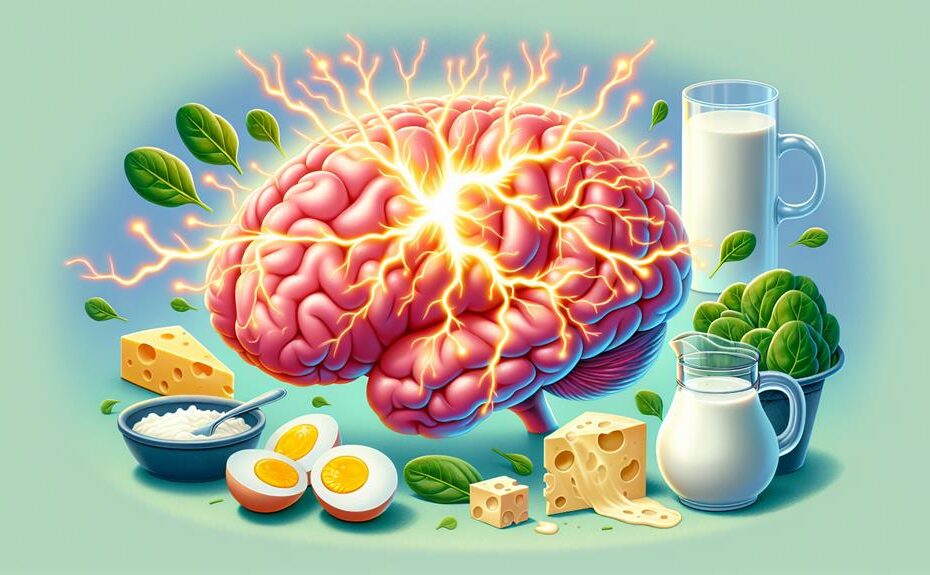







Vitamin B12 is essential for nerve health, aiding in DNA synthesis, myelin production for nerve protection, and neurotransmitter synthesis important for cognitive function, memory, and mood regulation. It plays a role in myelin formation, maintaining synaptic plasticity, and preventing cognitive decline. Adequate levels support peak brain function, energy production, and neuroprotection. Deficiency can lead to neurological symptoms, cognitive issues, and increased risk of neurodegenerative conditions. Make sure you maintain sufficient Vitamin B12 levels for overall neurological well-being and cognitive health. Learn more about the intricate neurological benefits of Vitamin B12.
Key Takeaways
- Vitamin B12 supports nerve health and regeneration, crucial for neurological function.
- Essential for myelin formation, protecting nerve fibers and aiding signal transmission.
- Key role in neurotransmitter synthesis, impacting cognitive function and mood regulation.
- Helps prevent neurological disorders, cognitive decline, and supports brain health.
- Supports brain development, combats aging effects, and aids in optimal energy production for cognitive function.
Importance of Vitamin B12 for Neurons
Vitamin B12 plays a critical role in maintaining the health and function of neurons in the central nervous system. It is essential for nerve health and supports neuron regeneration. Neurons are the building blocks of the nervous system, responsible for transmitting information through electrical and chemical signals. Vitamin B12 is involved in the synthesis of DNA, which is crucial for the growth and repair of neurons. Additionally, this vitamin helps in the production of myelin, the protective sheath that surrounds nerve fibers and speeds up signal transmission.
Studies have shown that vitamin B12 deficiency can lead to neurological symptoms such as numbness, tingling, and memory problems, indicating its importance for proper nerve function. Moreover, adequate levels of vitamin B12 have been linked to improved cognitive function and overall brain health. Hence, ensuring sufficient intake of vitamin B12 is vital for maintaining healthy neurons and supporting the best nervous system function.
Role in Myelin Formation
Playing an essential role in the formation of myelin, vitamin B12 contributes greatly to the protective sheath that surrounds nerve fibers and facilitates efficient signal transmission. Myelin is pivotal for nerve insulation and protection, as it acts as a barrier that enhances the speed and accuracy of nerve impulses. Vitamin B12 plays a significant part in myelin repair and regeneration, ensuring the maintenance of this vital structure in the nervous system. Myelin damage can lead to serious neurological conditions, making the role of vitamin B12 in supporting its formation indispensable for overall nerve health.
Research indicates that vitamin B12 deficiency can result in impaired myelin formation and repair processes, leading to disruptions in signal transmission between neurons. This deficiency may contribute to symptoms such as numbness, tingling sensations, and muscle weakness, which are often observed in individuals with neurological disorders associated with myelin damage. Maintaining adequate levels of vitamin B12 is crucial for supporting top-notch myelin function and overall nerve health.
Impact on Neurotransmitter Synthesis

Contributing to the intricate process of neurotransmitter synthesis, vitamin B12 plays a critical role in the efficient production and regulation of key signaling molecules in the central nervous system. Neurotransmitter regulation is essential for maintaining synaptic plasticity, which is important for excellent brain function. Vitamin B12 supports the synthesis of neurotransmitters such as serotonin, dopamine, and norepinephrine, all of which are involved in mood regulation, cognition, and overall brain health.
Research suggests that vitamin B12 deficiency can lead to imbalances in neurotransmitter levels, potentially impacting cognitive performance and mental well-being. By ensuring an adequate intake of vitamin B12, you can support the synthesis and proper functioning of neurotransmitters, ultimately promoting excellent brain health and cognitive function.
Furthermore, vitamin B12's role in neurotransmitter synthesis highlights its importance in maintaining neural pathways responsible for memory, learning, and other cognitive processes. Adequate levels of vitamin B12 may contribute to improved neurotransmitter balance, enhancing overall cognitive performance and mental acuity.
Cognitive Function and Memory
In the domain of cognitive function and memory, the intricate interplay between neurotransmitter synthesis and neural pathways underscores the significance of essential levels of vitamin B12 for maintaining and enhancing brain health. Vitamin B12 plays a vital role in the synthesis of neurotransmitters such as serotonin and dopamine, which are indispensable for cognitive processes like learning, memory, and decision-making. Research suggests that vitamin B12 deficiency may lead to cognitive decline and memory impairment due to disruptions in these neurotransmitter pathways.
Brain health heavily relies on the efficient functioning of neural networks, which are supported by sufficient levels of vitamin B12. Studies have shown that vitamin B12 supplementation can improve cognitive function in individuals with deficiencies, enhancing memory, concentration, and overall cognitive performance. Cognitive enhancement through vitamin B12 intake is linked to its role in maintaining nerve myelin integrity, supporting neuronal communication, and protecting against neurodegenerative conditions that affect cognitive abilities.
Mood Regulation and Mental Health

Vitamin B12 plays a crucial role in regulating mood and promoting mental health through its impact on neurotransmitter synthesis and neural function. Adequate levels of vitamin B12 are vital for stress management and emotional stability. Research suggests that vitamin B12 deficiency may contribute to mood disorders such as depression and anxiety. By supporting neurotransmitter production, particularly serotonin and dopamine, B12 aids in maintaining emotional balance and overall well-being.
Furthermore, vitamin B12 is essential for cognitive performance and preventing brain fog. Studies have linked B12 deficiency to cognitive impairments, including memory problems and decreased concentration. The vitamin is involved in the synthesis of myelin, a protective sheath around nerves that is vital for efficient neural communication. Ensuring sufficient B12 levels can enhance mental clarity and promote the best brain function.
Prevention of Neurological Disorders
To enhance neurological health and reduce the risk of disorders, maintaining ideal levels of vitamin B12 in your body is essential for promoting proper nerve function and cognitive wellbeing. Vitamin B12 plays a critical role in brain health by contributing to the formation of myelin, a protective sheath around nerves that facilitates proper nerve signaling. Adequate levels of vitamin B12 are necessary to prevent nerve damage and maintain peak nerve function. Research suggests that vitamin B12 deficiency can lead to neurological disorders such as peripheral neuropathy, which is characterized by numbness, tingling, and muscle weakness due to nerve damage. Additionally, vitamin B12 helps in the production of neurotransmitters that are essential for cognitive function and mood regulation. By ensuring sufficient intake of vitamin B12 through diet or supplements, you can support your nerve function, reduce the risk of neurological disorders, and promote overall brain health.
Brain Development and Aging

Sustaining ideal levels of vitamin B12 is essential for supporting brain development and combating the effects of aging on neurological function. Vitamin B12 plays a critical role in maintaining brain health by contributing to cognitive functions and preventing cognitive decline. Research suggests that vitamin B12 is indispensable for neuroplasticity, which is the brain's ability to reorganize itself by forming new neural connections throughout life. Adequate levels of vitamin B12 are also pivotal for preserving synaptic function, which is essential for neurotransmission and communication between brain cells.
As individuals age, the risk of cognitive decline increases, making it even more important to ensure sufficient intake of vitamin B12 to support optimal brain function. Studies have shown that low levels of vitamin B12 are associated with a higher risk of cognitive impairment and dementia in older adults. By promoting neuroplasticity and maintaining synaptic function, vitamin B12 can help combat the effects of aging on the brain and support overall cognitive health. Ensuring adequate levels of vitamin B12 through diet or supplementation is hence critical for promoting healthy brain aging and preserving cognitive function.
Energy Production in Neurons
Effective energy production in neurons is essential for maintaining top brain function and supporting neurological processes. Neuronal signaling, which is imperative for cognitive functions, heavily relies on efficient energy metabolism. Mitochondria play a pivotal role in this process by generating adenosine triphosphate (ATP), the primary energy currency of cells. Vitamin B12 is involved in the synthesis of succinyl-CoA, a key compound in the citric acid cycle that occurs in mitochondria. This cycle is critical for extracting energy from nutrients and producing ATP. Additionally, vitamin B12 aids in the metabolism of fatty acids and amino acids, further contributing to energy production in neurons.
Proper mitochondrial function is paramount for the energy demands of neurons, as these cells require substantial amounts of ATP to maintain membrane potentials, propagate action potentials, and support neurotransmitter release. Insufficient vitamin B12 levels can lead to compromised mitochondrial function, potentially impairing neuronal energy production and affecting various neurological processes. By ensuring an adequate intake of vitamin B12, you can help optimize energy production in neurons and support overall brain health.
Neuroprotective Properties of Vitamin B12

Enhancing neuronal resilience, Vitamin B12 exhibits significant neuroprotective properties through its involvement in various cellular mechanisms important for safeguarding against neurological damage and promoting ideal brain function. Vitamin B12 plays a critical role in neurological repair by contributing to the production of myelin, a protective sheath that surrounds nerves and facilitates efficient nerve impulse transmission. Additionally, Vitamin B12 is essential for the synthesis of neurotransmitters like serotonin and dopamine, which are important for mood regulation and cognitive function.
Research suggests that Vitamin B12 deficiency may lead to neurodegenerative conditions and cognitive decline. By ensuring an adequate intake of Vitamin B12, you can potentially enhance cognitive performance and protect against neurological disorders. Moreover, Vitamin B12 has been linked to the reduction of homocysteine levels, which, when elevated, can increase the risk of neurovascular damage and cognitive impairment. Incorporating Vitamin B12-rich foods or supplements into your diet may support neuroprotection, cognitive enhancement, and overall brain health.





